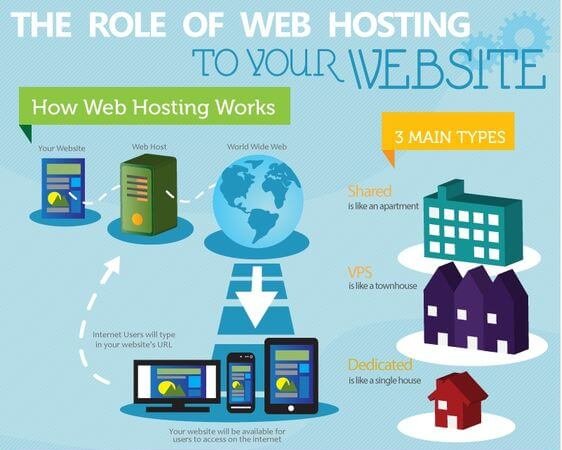
A Hosting Company, or Host, enables you – whether an individual or a company – to put your website on the web.
To do this, a Hosting Company rents space on their server for your files to be stored. The Host then provides an IP address for your domain name (check out this blog to explain what a domain name is).
IP addresses usually looks a bit like 232.17.43.22. But it is much easier to remember a name than a number, so every IP number also has a name attached – your domain name. The Internet Corporation for Assigned Names and Numbers (ICANN) coordinates the links between IP addresses and domain names. This ensures that your name cannot be used by anyone else for a different IP number.
There are three main ways you can rent space from a Hosting Company:
- Shared hosting: a number of websites share the same IP address, but have different domain names. Some hosts provide a free service – you will have adverts on your site, and your site will not be able to have more than a handful of visitors at any time. A paid service will be advert-free and be able to handle more visitors – good value for most small- to medium-sized businesses and bloggers. We host our websites on shared hosting.
- VPS (Virtual Private Server) hosting: this mimics a dedicated server, but is within a shared hosting environment. You will have a dedicated container within the shared server, which you can customise (if you have the knowledge). More expensive, but more tailored.
- Dedicated hosting: a dedicated server for your website. This is the most expensive service, but suitable if you have a large site which attract high numbers of visitors or numbers of transactions.

(Thanks to Name Ninja for this Infographic.)
You can have more than one domain name mapped to a single website.
For example, if anyone searches for greengingerdesign.com, they are automatically re-directed to greengingerdesign.co.uk.
You don’t need to have a unique IP address for your website, although it is worth considering it if you need a SSL certificate. (What – more jargon? SSL stands for Secure Sockets Layer. This enables your site to encrypt information like credit card details, so is essential for an e-commerce site.)
Shared Hosting will usually give you a shared IP address (although you can usually specify a unique IP address for an extra charge), and VPS Hosting and Dedicated Hosting will give you a unique IP address.
Having a domain name and space on a hosting site doesn’t mean anything without the content though – and it is the website files that your visitors see. If you want a website designed, why not fill out our Design Brief? We would love to help.
